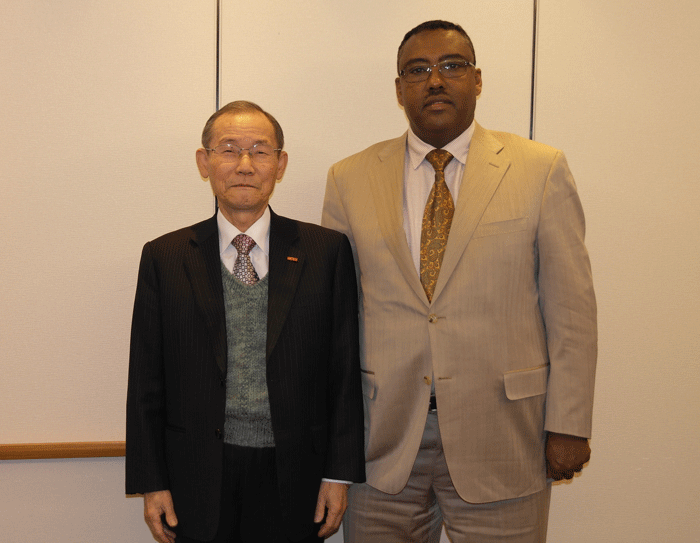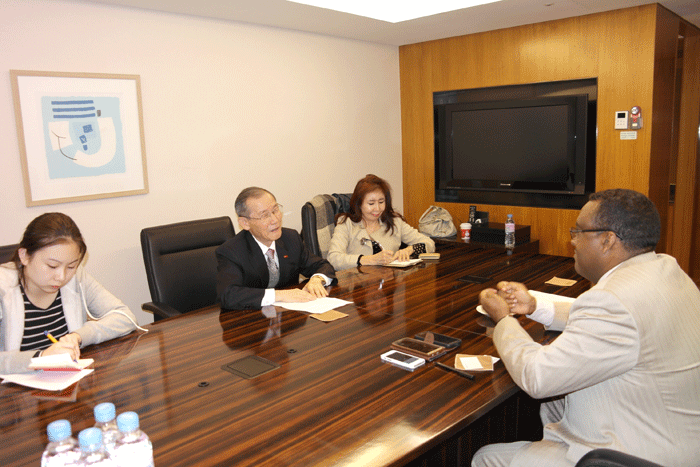An exclusive interview with Deputy Prime Minister of Ethiopia
Deputy Prime Minister Demeke Mekonnen Hassen of the Federal Republic of Ethiopia said that Ethiopia has a blood-forged relationship with Korea, is a very peaceful country, which has never been colonized by any foreign country throughout its history, and has many other conditions attractive to Korean investors in his country, including very competitive labor, plenty of resources and a very convenient transportation system, such as airlines connections.
Ethiopia is the only country in Africa with a direct flight with Korea and at that the Ethiopian Airways flies the latest B787 planes.
Speaking at an exclusive interview with The Korea Post at Lotte Hotel in Seoul on Dec. 1, 2014, he said, “Infrastructure in Ethiopia is developing and everything is becoming more conducive and so it is time for South Korean investors to come and invest.” Here are excerpts from the interview:

Of course yes. As you know, Koreans and Ethiopians are special friends. Their partnership and cooperation were cemented by blood.
In the contemporary world, these two countries, Korea as a developed and civilized country and Ethiopia, after a long suffering, ups and downs, entering a new chapter to join the Korean roadmap, is a special platform for these two countries.
When you look at the partnership, it’s not the government levels only but business community levels and people to people levels and, to me, that is a multi-faceted and all-around partnership. From this, to sustain this one, business communities and investors’ engagement are very crucial.
So having investors from South Korea, who have knowledge and different capacities and resources, we give special consideration to such kind of investors.
In Ethiopia, the comparative advantage to work in Ethiopia and investors here, the first one is that Ethiopia is a peaceful country as the center of Africa. It is the center of Africa, where the previous African union, the Organization of African Unity (OAU), and the current African union are at (Addis Ababa). Ethiopia’s Addis Ababa, the capital city of Africa, with now nearly four million people, next to New York and Brussels, it is the hub center for Africa. New York, for United Nations, and Brussels, for Europe, and Addis Ababa is the center for Africa and other international communities.
In Addis Ababa, there is a lot of creativity and dynamism but also as a peaceful and predictable one. Any business, whether it is real estate, higher education, construction industry, or mining, is welcome in Addis Ababa today.
We are calling foreign investment with attractive mechanisms to invest in different areas. Manufacturing is almost an infant industry. We were agrarian up to now. We are seeking to transform the country into industrialization by chipping in cheap labor.
We have very strong airways. We fly to more than sixty countries. Directly to Latin America, Brazil, Washington, different parts of Europe, all in Africa, Tokyo, Seoul, and three places in China. It is the best in Africa. Now, we are constructing airways to ports to Djibouti.
Infrastructure is developing and everything is becoming more conducive so it is time for South Korean investors to come here and invest.
Q: Many countries offer foreign investors incentives. What incentives does Ethiopia offer to Korean investors?
A: For private investors, especially focusing on manufacturing industries, there are lists of priority areas like getting preferred treatment on customs, duty free items, tax free mechanisms.
Additional proposals are submitted to the government to be approved at least in the end of this month to make investment attractive and competitive.
The other thing is that in Ethiopia, rules and interrelations are very strong. We can’t say we are free from corruption, but it is not an overriding environment and the government is very cautious.
Q: What are the major products of Ethiopia which Korean consumers might find attractive and want to import from Ethiopia?
A: Traditionally, our export is focused on coffee, number one, gold, some oil products, leather products but now we are focusing to diversify our exports. Number one is to increase the volume of coffee to be exported. Number two is to process agricultural products to finished goods, like shoes.
Another one is to focus on textile, garments industry.
We are continuing our gold and other mineral exports. Ethiopia is number one in Africa on its animal resources, yet we do not harvest them in the proper way. We are focusing on how to improve the health of our animals and how to harvest them in a productive way. In the future we have to diversify; we have huge and immense animal potential like cows, sheep, goats, and others.
Up to now we have been discouraging to export animal meat because the local people will be afflicted and the price will increase; we are rethinking that one. Export-oriented strategy is our central policy and diversifying is another one.
We are finalizing sugar factories, with more than 200 hectares of land for sugar plantage. We hope Ethiopia to become a leader country in the world to export sugar. Koreans have to look which is appropriate for import.
Q: What is the general view of Ethiopian people on Koreans?
A:
The Korean experience is highly appreciated in Ethiopia. From 1950s, 60s to now, from its different problems to how they managed to reach a civilized country, as having the 13th or 14th strongest economy in the world.Koreans in 1950s and 60s, were in a terrible situation, and then they jumped from the ashes to this civilization. Ethiopians wish to follow this path. Everybody in Ethiopia, they’re very, very keen and proud of how Koreans achieved such development. People are also aware of how Koreans are polite and respectable.
Q: Does Ethiopia have many tourist destinations that are attractive to Korean visitors?
A: Of course. Ethiopia is becoming one of the best destinations for tourists. Why? Because of peace. Too, there are many historical, natural, and religious sites. We have nine properties registered by UNESCO that is number one in Africa. Great monuments constructed before 3000 years, amazing places. It’s a very rich country in tourism.
The other one is that all the days and nights are equal. All 12 hours of the day are bright, other 12 hours are dark -- it’s equally divided. This is the only place in the world that is Ethiopia. There is no heavy winter or hot summer; it’s almost average. The average temperature is the room temperature.
Also, we have a different calendar, different working hours, and different months. All the days and the nights are naturally equal. When the sunrise begins, we count our clock and when it reaches the middle, it is mid-day, and then the sun goes down and at sunset, the day is finished.
The evening night starts; the mid-night is again the middle and when the dark is finished, the sun comes up and it is the other day.
The other one is that all 12 months are thirty days so we have 13 months.
Our new year is September, not January. It follows the natural cycle, summer to winter, for our winter, meaning our rainy season is June to August. Ethiopian calendar follows the nature.
We have our own letters, own alphabet, own numbering systems, and we are the only one that has not been colonized by super powers.

Q: Please explain about yourself, including your career and personal background.
A:
I grew up in the rural area, I come from a (perhaps, rich) peasant family. At the age of 9, I started school and then I went to a university, had my first degree in science in 1987. I joined a teaching profession for five years and after that I joined politics for the last twenty one or two years.I used to be the bureau deputy president of the region and in 2008, I came to the federal government, I was assigned as the minister of education, I served there for some five years and was transferred as a deputy prime minister. I am now coordinating the technology and social class sectors of education.
I did my master’s degree in the United Kingdom in 2003 in political science. It was a jump from natural sciences to political science. I had been in the UK for fourteen months and last year, on December 5th, I was offered an honorary degree in education and science.
I married in 1995 and I have four children, two boys and two girls. My first child is a science student in Ethiopia, to become a medical doctor in Ethiopia. My second son is interested in politics, may follow my life. I am very happy in my father’s and mother’s life. My father is 96 years old. My mother is 79 years old.
Q: How does one make a prime minister in Ethiopia?
A:
In our political system, that depends on the work and the favor of the leader. I might go to regional government leadership, to the ministry, to the prime minister’s office, to continue my position. The ruling party proposes the prime minister to the Parliament. The majority vote of the Parliament decides. And then the prime minister again proposes the deputy prime minister to the Parliament and the Parliament will approve or disapprove. If you’re not accepted by either one, you can’t have that position.Q: Does your Prime Minister have any plan to visit Korea?
A: We hope so. I think our prime minister has already invited the President of Korea to visit Ethiopia and depending on our prime minister might visit Korea in exchange. That will be managed by two foreign ministers.
Q: Have you ever visited Korea before? If not, had you heard about Korea before you came to Korea? If so, what’s the difference, if any, between what you learned about Korea and what you actually see here in Korea now?
I read many books about Korea and many of my friends had been here for visits and even for longer time. Here, the system is very standardized. Your focus on science and technology and human resource development impressed me, that is a landmark from your side and there are a lot to come from in this regard.

